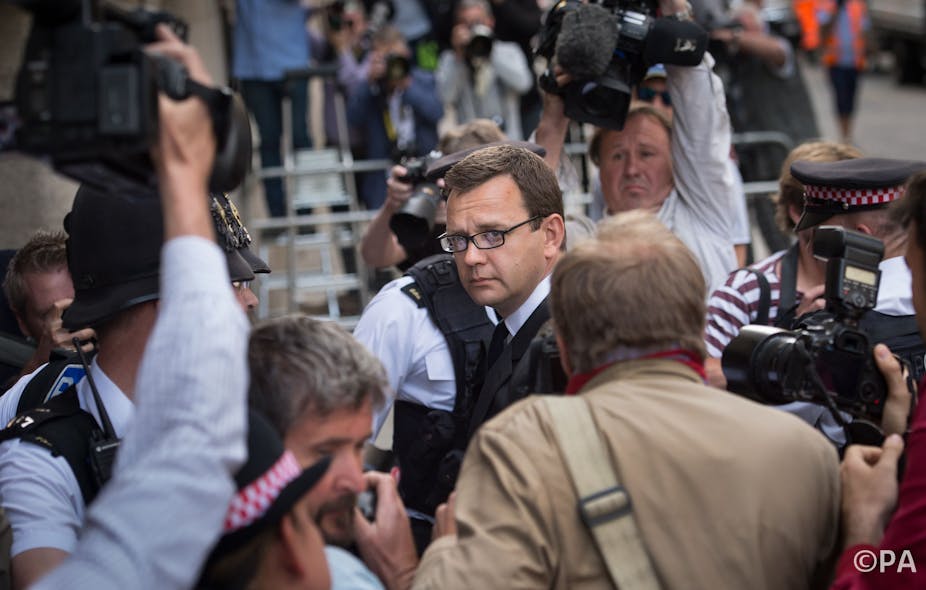On the day that Andy Coulson was sentenced to 18 months for his part in the industrial-scale phone hacking that went on at the News of the World, we will no doubt hear from the industry that this is proof the system has worked: wrongdoing has been detected, wrongdoers identified and punished.
But before we sit back and say: “job done” we should pause to reflect on the wider malaise afflicting journalism in this country.
It was the McCann case that convinced me something was seriously wrong with British journalism. Day after day, week after week in 2007-8, a stricken couple were monstered on the front pages of national newspapers and though a few people complained nobody would do anything about it.
It is easy to forget, but that began less than four months after the first phone-hacking convictions – the time we were first asked to believe it was the work of just one rogue reporter. You might think newspapers would have been on their best behaviour.
Eventually and reluctantly the McCanns sued – they had been desperate not to make things worse because they needed the media in the hunt for their daughter. They won, of course, and it slowed down the libels, but it didn’t stop them. And the papers learned nothing, going on to monster Bristol teacher Christopher Jefferies in just the same way.
But hacking and libelling are not the problem in journalism, as Lord Justice Leveson found. They are merely two of the symptoms. The problem is one of power run amok, of unaccountability and of a loss of ethical standards.
Harsh? Well it is true that British journalism can be brilliant, and is mostly good. But no one, least of all journalists, judges any institution, industry or profession by its best or even its average performance. Like it or not they – we – tend to be measured by the worst that we do, and by how much effort we make to improve.
When a plane crashes we do not shrug, point to a million safe landings and say: “It was just one rogue plane.” Life is not like that. Nor do we simply say: “Let’s leave it to the airlines to see if there’s a problem.”
British journalism has crashed badly a dozen times in this century alone, and it has proved beyond all doubt that it is not capable of finding the problem, let alone fixing it.
After the disaster that was the McCann coverage, what did journalism do to put its house in order? Nothing. Astonishingly, even after something like a thousand front-page libels, the Press Complaints Commission (PCC) never once considered the case. (I sometimes wonder how those people live with themselves.)
Bully pulpit
When newspapers were caught spending millions hiring private investigators who stole people’s personal data, what did the industry do? It lobbied the prime minister to make sure that the penalties for data theft remained ridiculously low.
As for the phone-hacking scandal, the big newspaper companies that account for 90% of national daily circulation didn’t expose it. They didn’t investigate it. They didn’t even condemn it. Instead they made excuses for it, lied about it and pretended that it was the fault of the police, the politicians, the private eyes – anyone but themselves.
Dragged into the Leveson Inquiry, their editors and proprietors behaved like sulky children, while outside the courtroom their reporters did everything in their power to smear, mock and denigrate the proceedings.
And when the judge told them what action was necessary to protect the public from further outrages in the future, what did they do? They raised two fingers and said get lost.
Accountability is not control
They have no evidence-based, rational argument against the Leveson recommendations. It is not “state control” or anything like it. It does not impinge on freedom of expression, indeed it offers unprecedented safeguards against political interference. It will not reduce the diversity or liveliness of our media.
What it might do, however, is oblige the worst journalists we have to start checking their facts. It might make them accountable when they treat people unfairly. And it would give ordinary people cheap access to justice when papers breach their legal rights.
Plainly this does not suit the people behind such outrages as industrial-scale data theft, the serial libelling of the McCanns and the hacking of thousands of phones. Those people have simply refused to have anything to do with a Leveson scheme designed to protect the public through independent, effective press self-regulation.
IPSO-facto
Instead, with astounding chutzpah, the big newspaper groups have created IPSO, a cosmetically-altered PCC that will continue to act as a buffer for public complaint and as a blanket to cover up systemic wrongdoing. And, just as they did with the PCC for two decades, they are deploying all their propaganda power to convince the public that IPSO is the eighth wonder of the world.
British journalism has crashed, and the hacking verdicts are further proof of that. The press itself cannot and will not fix the problem, but Leveson showed how it could be done. Rupert Murdoch and his friends must now be shamed into abandoning IPSO and doing what the judge said. If they don’t, it will crash again, and again, and the victims, again and again, will be the blameless, the powerless and the vulnerable.

